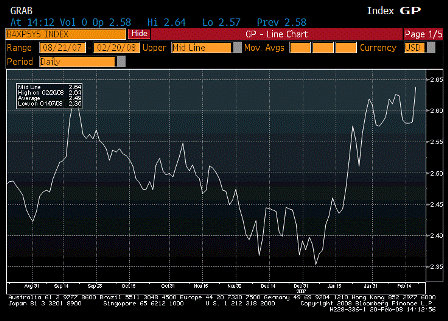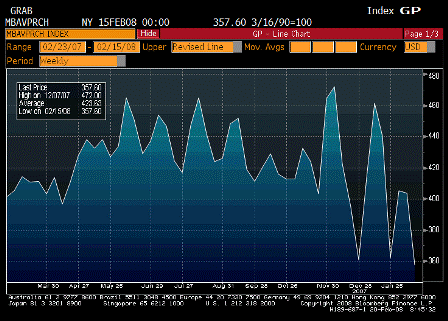
MBAVPRCH Index (Feb 15)
| Survey |
n/a |
| Actual |
357.6 |
| Prior |
403.9 |
| Revised |
n/a |
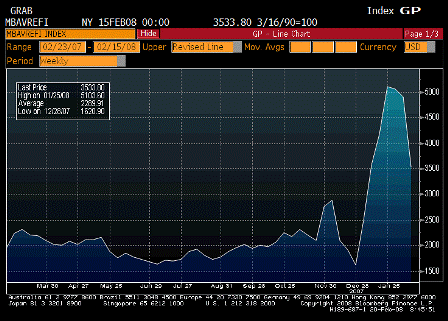
MBAVREFI Index (Feb 15)
| Survey |
n/a |
| Actual |
3533.8 |
| Prior |
4901.5 |
| Revised |
n/a |
These look very weak.
Banks are not included, so there’s a chance the banks could be taking market share from the mortgage bankers.
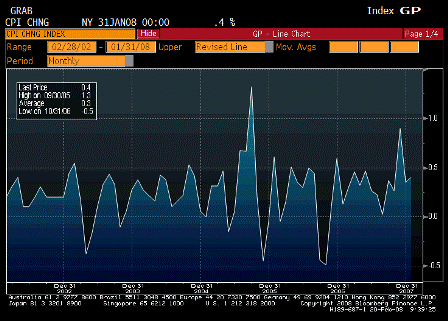
Consumer Price Index MoM (Jan)
| Survey |
0.3% |
| Actual |
0.4% |
| Prior |
0.3% |
| Revised |
0.4% |
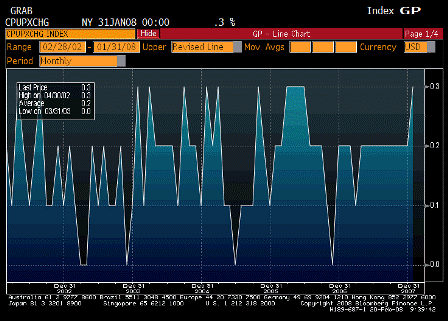
CPI Ex Food & Energy MoM (Jan)
| Survey |
0.2% |
| Actual |
0.3% |
| Prior |
0.2% |
| Revised |
n/a |
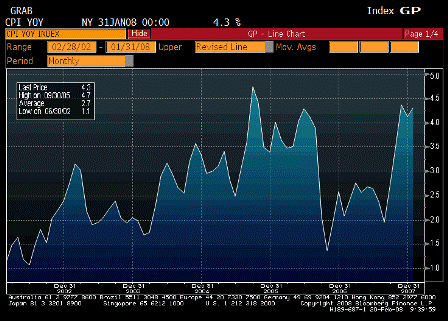
Consumer Price Index YoY (Jan)
| Survey |
4.2% |
| Actual |
4.3% |
| Prior |
4.1% |
| Revised |
n/a |
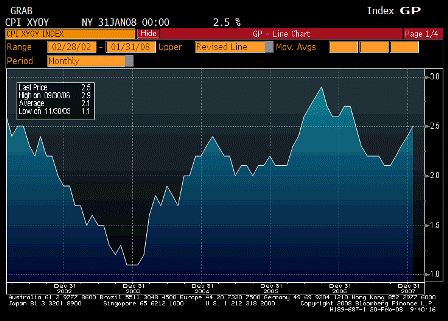
CPI Ex Food & Energy YoY (Jan)
| Survey |
2.4% |
| Actual |
2.5% |
| Prior |
2.4% |
| Revised |
n/a |
Today’s CPI report shows inflation is moving up sharply. If it was above Yellen the dove’s comfort zone last week it even further above it now. Same with Mishkin, who more than once said the FOMC had to be prepared to reverse course as needed.
Stocks are sensing they may be ‘on their own’ if the Fed is constrained by inflation.
Yes, the economy is weak, growth near 0 (see housing below), but demand is high enough to keep pushing food, crude, and import/export prices ever higher.
The Fed seeks an output gap/GDP growth consistent with inflation within their comfort zone.
Stronger growth will increase their inflation forecasts, while weaker growth is expected to bring inflation down.
Higher prices for food and crude are also presumed to bring out supply side responses, thereby bringing prices down.
But they also believe this has to happen before inflation expectations elevate, otherwise the higher prices get ‘monetized’ and a relative value story turns into an inflation story.
The data is now showing that is starting to happen, and for most FOMC time has probably run out. They may now feel they have used up all the past ‘credibility’ that has kept inflation expectations ‘well anchored’ trying to ‘forestall’ a financial collapse.
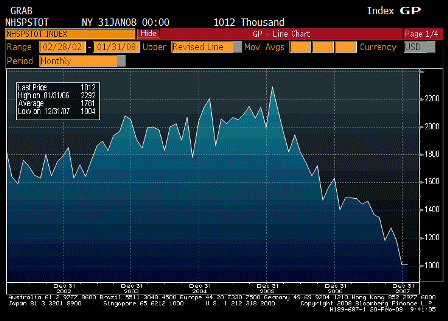
Housing Starts (Jan)
| Survey |
1010K |
| Actual |
1012K |
| Prior |
1006K |
| Revised |
1004K |
A glimmer of hope, but not much, but still winter numbers. Better picture will emerge by March.
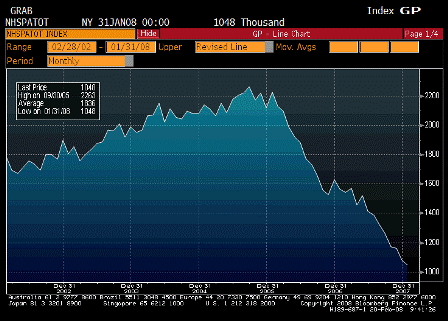
Building Permits (Jan)
| Survey |
1050K |
| Actual |
1048K |
| Prior |
1068K |
| Revised |
1080K |
No sign of a turn here.
From Karim:
Core up 0.311%; with headline spurred by food and energy (each up 0.7%). Y/Y up to 2.5% from 2.4%
OER up another 0.3% and medical up 0.5%
Some items unlikely to repeat next month are lodging away from home, which was up 1.1%.
Also, apparel (which was up 0.4%) has now risen 5 straight months. This series usually chops around and like lodging away from home, has seasonal adjustment issues. Tobacco up 1.1% after 0.8% prior month. Expect all of these to reverse over next 1-2 months.
Maybe, maybe not. With import prices and local costs rising, cost-push-inflation can keep things moving up until all catches up with food/energy numbers.
Also, many wage agreements, including government, and other contracts have CPI escalators, which sustain demand for the ever higher prices.
Housing starts tick up 0.8% from downwardly revised December number; single family starts down another 3% to lowest since 1/91
Building permits down another 3% (typically leads starts)
Bottom line is Fed is likely to believe that the pattern of growth and inflation of the past two easing cycles will repeat itself (chart attached); that is inflation typically peaks about 2-3 years after the peak in growth. Fed Member Stern (voter) referred to this yesterday where he said he expected core to come down over the next several years but not anytime soon, and that recent rate cuts were ‘wholly appropriate’.
Agreed, they may believe that, but they also believe that if inflation expectations elevate, the higher prices get ‘monetized’ and don’t revert.
That’s why they are so focused on the inflation expectation indicators, which they also know are difficult to read and not considered completely reliable.

